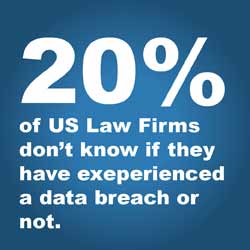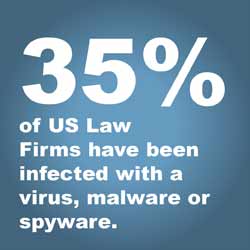Law firm cybersecurity is a regulatory and moral obligation. While the challenges around preventing a law firm data breach recently increased due to social distancing requirements of the last year, the requirements to secure data remain stringent. The door to remote legal practice has now been opened and it is probably never going to close back up. Here’s what you need to know about law firm cybersecurity and remote work.
Risks of Data Breach for Law Firms
With the digitization of client records and increasingly stringent privacy regulations, law firm IT has more liability risks around information security than ever. A 2019 survey on law firm cybersecurity by the American Bar Association revealed that about 26% of law firms experienced some kind of data breach while almost 20% said they were uncertain whether they had experienced a breach or not. More than 35% of law firms said their systems have been infected by a virus, spyware or malware.

Top Risks of a Law Firm Data Breach
The ABA survey identified these as top risks after experiencing a law firm data breach.
- Consulting fees to resolve problems caused by breach 37%
- Downtime loss of billable hours 35%
- Costs for replacing hardware or software 20%
- Destroyed or lost data 15%
- Notifying clients of the data breach 9%
- Exposure of sensitive non-client data 4%
- Exposure of sensitive client data 3%
Cybersecurity for Law Firms
Cybersecurity is an ongoing problem facing law firms. While threats like data breaches and viruses continue to grow, there are actions law firms can take to protect themselves. You may also be interested in Cyberattacks and How to Defend Your Small Business
8 Ways to Secure Law Firm IT Against Cybersecurity
- Create and enforce basic security practices & policies and communicate them to your team.
- Create and enforce a BYOD security policy
- Monitor and firewall your network
- Backup regularly
- Require separate user accounts with strong passwords for all users.
- Audit your security regularly to ensure it’s up to date
- Create security training opportunities for your team
- And of course, install the latest security software and keep apps up to date with the latest versions.
Related Reading: Defining Cloud Governance and Why It’s Important
Law Firm Ethical and Regulatory Security Obligations
“Attorneys have ethical and common law duties to take competent and reasonable measures to safeguard information relating to clients and also often have contractual and regulatory duties to protect confidential information,” said a Law Practice Today article.
Law Firms are ethically bound by the following, according to Law Practice:
- Ethics Rules on Safeguarding Information
- Ethics Opinions on Safeguarding Information
- Ethics Rules on Electronic Communications
- Ethics Opinions on Electronic Communications
- Common-Law and Contractual Duties
- Regulatory Duties
Law firms are not only expected to take all reasonable measures to secure their systems and protect client data; if a law firm is hacked in any way, it is also the opinion of the ABA that they are morally obligated to notify their clients that a breach occurred.
See ABA Model Rules pertaining to Law Firm Cyber Security: Click Here
Cybersecurity Audits
Regular audits of cybersecurity is essential to securing sensitive law firm data. “When it comes to cybersecurity, it’s difficult to improve anything if what already exists is a mystery,” said a recent article on security from TechRepublic.com. So what does this mean?
A cyber security audit is a complete review and analysis of IT infrastructure and helps mitigate the consequences of a breach. Cybersecurity audits are vital to building, maintaining and improving a law firm’s comprehensive cybersecurity. Regular auditing is also key to demonstrating a firm’s commitment to security and the prioritization of protecting client data.

How to prepare for a cybersecurity audit:
- Review security policies
- Organize your cybersecurity policies into a single comprehensive document
- Map out technology and network environment
- Review key compliance standards
- Create a list of security resources in place
What to expect in a cybersecurity audit:
A cybersecurity audit is generally a one-day audit that sets out to review all of your IT resources, identify vulnerabilities and the likelihood of your organization coming under attack.
Auditors will likely review:
- Firewalls and other preventative technologies
- Network monitoring practices
- Password policies
- User account restrictions
- Details about access controls
- Internet use policies
- Incident response plan
- BYOD policies
Data and Security Policies
How To Protect A Law Firm Against Cyber Attacks
- Train Your Team – Set up security practices and policies that include responsible internet usage guidelines and email usage guidelines. Stay up-to-date on latest threats and educate your team.
- Protect Your Resources – Security software should be installed to protect your network. Keep all apps up to date with the newest versions, including web browsers, email, web apps and operating systems. Leverage antivirus software to scan software updates.
- Monitor and Firewall Your Network – Protecting your network behind a firewall is a basic and essential security measure. Monitoring your systems for any sign of a breach is critical. If you allow your staff to access your systems remotely, it is important to implement remote access usage policies and work with staff to secure home offices.
- Create and Enforce a BYOD Security Policy – If your team uses mobile devices like tablets or phones to access network resources and files, restrict usage to approved devices and require encryption. Your team should also know that quickly reporting stolen or lost devices to administrators is critical to keeping your network secure.
- Backup Regularly – Automatic weekly backups with copies stored offsite and in the cloud is critical to keeping your data safe should a breach occur, or even in the event of a natural disaster such as a fire or flood.
- Secure Your Devices and Apps with Strong Passwords – Require separate user accounts with strong passwords for all users. Consider implementing multi-factor authentication requirements and require password changes every 90 days.
- Audit your Security – As mentioned above, regular audits will ensure you are staying up-to date with the latest security challenges.

Why Private Dedicated Hosting is Key to Law Firm Cybersecurity
While the legal industry is often slow to adopt new technology due to its rigid regulations and adherence to law, the tipping point of going cloud has reached law firms. Law firms want to focus their talent resources on legal talent, so building and securing cloud environments is a costly distraction from their main mission. With this in mind, it is optimal for law firms to partner with a private cloud provider who understands the legal industry and can deliver dedicated cloud infrastructure tailored to the requirements of law firms.
With a cloud hosting provider who is totally focused on security, your law firm can spend more time focusing on delivering services to clients.
Tips for Your Law Firm’s Data Security in the Cloud
- Choose a hosting provider with a track record of serving the legal industry
- Choose a hosting provider who offers 24/7 monitoring
- Choose a hosting provider with the highest standards of security
8 things your hosting provider’s data center security should include:
- Multi-factor security infrastructure
- Alarmed access/egress points
- Kevlar impregnated drywall (NOC) and bulletproof glass (NOC)
- Man trap
- Onsite NOC staffing 24/7/365
- Biometric identification with dual factor authentication
- Video surveillance of core data center infrastructure and data rooms
- Perimeter detection alarms
Are you ready to go cloud and ensure your law firm cybersecurity is properly managed? See what CyberlinkASP can do for you:

